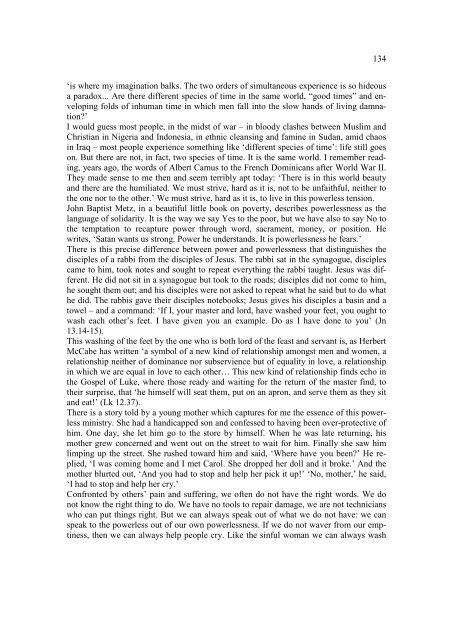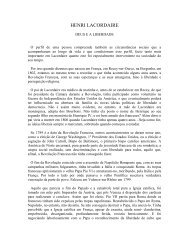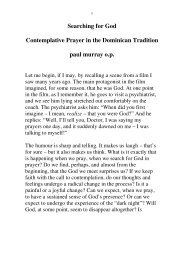acta capituli generalis diffinitorum ordinis praedicatorum fr. carolo a ...
acta capituli generalis diffinitorum ordinis praedicatorum fr. carolo a ...
acta capituli generalis diffinitorum ordinis praedicatorum fr. carolo a ...
You also want an ePaper? Increase the reach of your titles
YUMPU automatically turns print PDFs into web optimized ePapers that Google loves.
134<br />
‘is where my imagination balks. The two orders of simultaneous experience is so hideous<br />
a paradox... Are there different species of time in the same world, “good times” and enveloping<br />
folds of inhuman time in which men fall into the slow hands of living damnation?’<br />
I would guess most people, in the midst of war – in bloody clashes between Muslim and<br />
Christian in Nigeria and Indonesia, in ethnic cleansing and famine in Sudan, amid chaos<br />
in Iraq – most people experience something like ‘different species of time’: life still goes<br />
on. But there are not, in fact, two species of time. It is the same world. I remember reading,<br />
years ago, the words of Albert Camus to the French Dominicans after World War II.<br />
They made sense to me then and seem terribly apt today: ‘There is in this world beauty<br />
and there are the humiliated. We must strive, hard as it is, not to be unfaithful, neither to<br />
the one nor to the other.’ We must strive, hard as it is, to live in this powerless tension.<br />
John Baptist Metz, in a beautiful little book on poverty, describes powerlessness as the<br />
language of solidarity. It is the way we say Yes to the poor, but we have also to say No to<br />
the temptation to recapture power through word, sacrament, money, or position. He<br />
writes, ‘Satan wants us strong. Power he understands. It is powerlessness he fears.’<br />
There is this precise difference between power and powerlessness that distinguishes the<br />
disciples of a rabbi <strong>fr</strong>om the disciples of Jesus. The rabbi sat in the synagogue, disciples<br />
came to him, took notes and sought to repeat everything the rabbi taught. Jesus was different.<br />
He did not sit in a synagogue but took to the roads; disciples did not come to him,<br />
he sought them out; and his disciples were not asked to repeat what he said but to do what<br />
he did. The rabbis gave their disciples notebooks; Jesus gives his disciples a basin and a<br />
towel – and a command: ‘If I, your master and lord, have washed your feet, you ought to<br />
wash each other’s feet. I have given you an example. Do as I have done to you’ (Jn<br />
13.14-15).<br />
This washing of the feet by the one who is both lord of the feast and servant is, as Herbert<br />
McCabe has written ‘a symbol of a new kind of relationship amongst men and women, a<br />
relationship neither of dominance nor subservience but of equality in love, a relationship<br />
in which we are equal in love to each other… This new kind of relationship finds echo in<br />
the Gospel of Luke, where those ready and waiting for the return of the master find, to<br />
their surprise, that ‘he himself will seat them, put on an apron, and serve them as they sit<br />
and eat!’ (Lk 12.37).<br />
There is a story told by a young mother which captures for me the essence of this powerless<br />
ministry. She had a handicapped son and confessed to having been over-protective of<br />
him. One day, she let him go to the store by himself. When he was late returning, his<br />
mother grew concerned and went out on the street to wait for him. Finally she saw him<br />
limping up the street. She rushed toward him and said, ‘Where have you been?’ He replied,<br />
‘I was coming home and I met Carol. She dropped her doll and it broke.’ And the<br />
mother blurted out, ‘And you had to stop and help her pick it up!’ ‘No, mother,’ he said,<br />
‘I had to stop and help her cry.’<br />
Con<strong>fr</strong>onted by others’ pain and suffering, we often do not have the right words. We do<br />
not know the right thing to do. We have no tools to repair damage, we are not technicians<br />
who can put things right. But we can always speak out of what we do not have: we can<br />
speak to the powerless out of our own powerlessness. If we do not waver <strong>fr</strong>om our emptiness,<br />
then we can always help people cry. Like the sinful woman we can always wash










